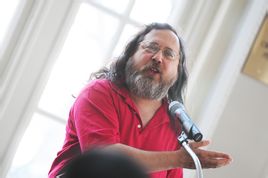
The initiator of free software activity RMS (Richard Matthew Stallman) gave a speech entitled “Freedom in your computer and in the net” at the biggest hacker conference 31C3 in Europe.
RMS explained:
1. The philosophical difference between free software and the open-source is that although their forms are both open source code, the former emphasizes on theoretical freedom, while the latter focuses more on the practicability that the code’s quality and cost can bring.
2. In the security aspect, free software is safer than the closed-source, things like submitting information before Windows fixing bugs seldom happen. More importantly, you don’t even know whether there is any other manufacturer doing this.
3. RMS also talked about why developing closed-source software is not a wise choice – even if you don’t do it and get starving, you can choose to steal some food, which is even better than doing it. “Civilized” countries would provide food for starving people, but US doesn’t belong to those countries, he said.
RMS thinks all the universities shall run reverse engineering classes, so that people can learn and figure out the working theory of closed world. Meanwhile, he thinks schools shall use free software, because they are bearing the duty to cultivate strong, capable, independent, modest and free citizens.
Since the European customers favor small-group consultation mode and governments of European countries wouldn’t like to rely on big closed-source manufacturers too much, RMS also mentioned the contributions made by European governments for subsidizing free software community. FSFE (Free Software Foundation Europe) recently published the code audition of funds towards free software stated at the European Conference 2015. (Click the link for more details.)
“This is a very welcome decision,” says FSFE’s president Karsten Gerloff. “Like most public bodies, the European institutions rely heavily on Free Software for their daily operations. It is good to see that the Parliament and the Commission will invest at least a little in improving the quality and the programs they use.”

